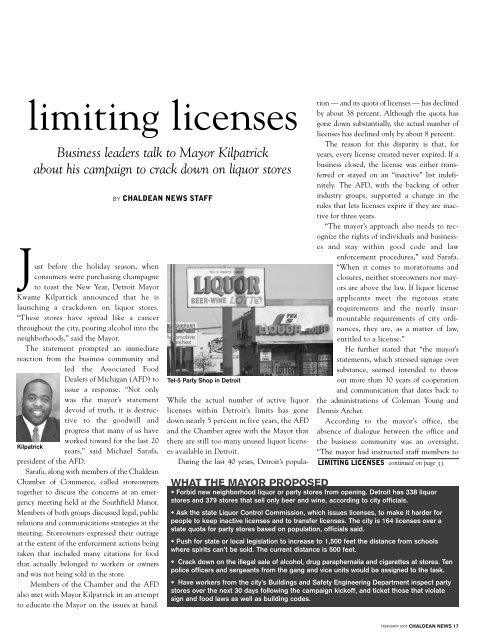Create successful ePaper yourself
Turn your PDF publications into a flip-book with our unique Google optimized e-Paper software.
limiting licenses<br />
Business leaders talk to Mayor Kilpatrick<br />
about his campaign to crack down on liquor stores<br />
Just before the holiday season, when<br />
consumers were purchasing champagne<br />
to toast the New Year, Detroit Mayor<br />
Kwame Kilpatrick announced that he is<br />
launching a crackdown on liquor stores.<br />
“These stores have spread like a cancer<br />
throughout the city, pouring alcohol into the<br />
neighborhoods,” said the Mayor.<br />
The statement prompted an immediate<br />
reaction from the business community and<br />
led the Associated Food<br />
Dealers of Michigan (AFD) to<br />
issue a response. “Not only<br />
was the mayor’s statement<br />
devoid of truth, it is destructive<br />
to the goodwill and<br />
progress that many of us have<br />
worked toward for the last 20<br />
Kilpatrick<br />
years,” said Michael Sarafa,<br />
president of the AFD.<br />
Sarafa, along with members of the Chaldean<br />
Chamber of Commerce, called storeowners<br />
together to discuss the concerns at an emergency<br />
meeting held at the Southfield Manor.<br />
Members of both groups discussed legal, public<br />
relations and communications strategies at the<br />
meeting. Storeowners expressed their outrage<br />
at the extent of the enforcement actions being<br />
taken that included many citations for food<br />
that actually belonged to workers or owners<br />
and was not being sold in the store.<br />
Members of the Chamber and the AFD<br />
also met with Mayor Kilpatrick in an attempt<br />
to educate the Mayor on the issues at hand.<br />
BY CHALDEAN NEWS STAFF<br />
Tel-5 Party Shop in Detroit<br />
While the actual number of active liquor<br />
licenses within Detroit’s limits has gone<br />
down nearly 5 percent in five years, the AFD<br />
and the Chamber agree with the Mayor that<br />
there are still too many unused liquor licenses<br />
available in Detroit.<br />
During the last 40 years, Detroit’s population<br />
— and its quota of licenses — has declined<br />
by about 38 percent. Although the quota has<br />
gone down substantially, the actual number of<br />
licenses has declined only by about 8 percent.<br />
The reason for this disparity is that, for<br />
years, every license created never expired. If a<br />
business closed, the license was either transferred<br />
or stayed on an “inactive” list indefinitely.<br />
The AFD, with the backing of other<br />
industry groups, supported a change in the<br />
rules that lets licenses expire if they are inactive<br />
for three years.<br />
“The mayor’s approach also needs to recognize<br />
the rights of individuals and businesses<br />
and stay within good code and law<br />
enforcement procedures,” said Sarafa.<br />
“When it comes to moratoriums and<br />
closures, neither storeowners nor mayors<br />
are above the law. If liquor license<br />
applicants meet the rigorous state<br />
requirements and the nearly insurmountable<br />
requirements of city ordinances,<br />
they are, as a matter of law,<br />
entitled to a license.”<br />
He further stated that “the mayor’s<br />
statements, which stressed signage over<br />
substance, seemed intended to throw<br />
out more than 30 years of cooperation<br />
and communication that dates back to<br />
the administrations of Coleman Young and<br />
Dennis Archer.<br />
According to the mayor’s office, the<br />
absence of dialogue between the office and<br />
the business community was an oversight.<br />
“The mayor had instructed staff members to<br />
LIMITING LICENSES continued on page 33<br />
WHAT THE MAYOR PROPOSED<br />
• Forbid new neighborhood liquor or party stores from opening. Detroit has 338 liquor<br />
stores and 379 stores that sell only beer and wine, according to city officials.<br />
• Ask the state Liquor Control Commission, which issues licenses, to make it harder for<br />
people to keep inactive licenses and to transfer licenses. The city is 164 licenses over a<br />
state quota for party stores based on population, officials said.<br />
• Push for state or local legislation to increase to 1,500 feet the distance from schools<br />
where spirits can’t be sold. The current distance is 500 feet.<br />
• Crack down on the illegal sale of alcohol, drug paraphernalia and cigarettes at stores. Ten<br />
police officers and sergeants from the gang and vice units would be assigned to the task.<br />
• Have workers from the city’s Buildings and Safety Engineering Department inspect party<br />
stores over the next 30 days following the campaign kickoff, and ticket those that violate<br />
sign and food laws as well as building codes.<br />
<strong>FEBRUARY</strong> <strong>2004</strong> CHALDEAN NEWS 17

















